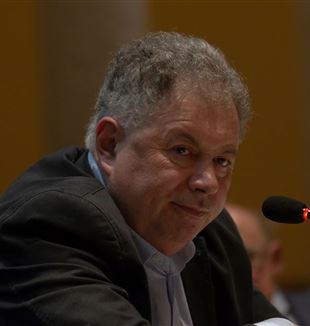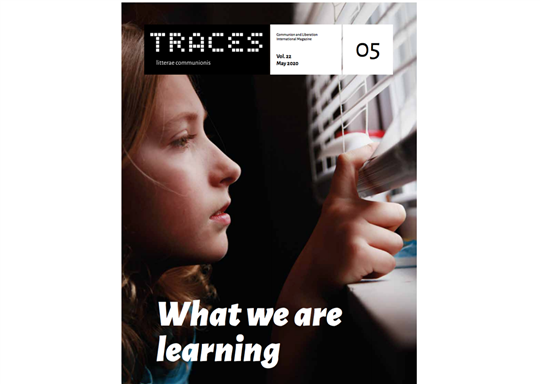
The renewal of my humanity
From the May issue of Traces, Vittadini reflects on the temptation to cling to all sorts of “have to be’s,” his decision to stay in the present at this difficult moment, and his understanding of work as a form of prayer.These days spent at home because of the pandemic have been truly upsetting. I have stopped trying to suppress the anxiety, pain, and worry by clinging to all sorts of “have to be’s,” like the “obligation” to be positive, the “obligation” to seize the opportunity to change, to learn, and to improve my- self, and even the “obligation” to seek the Lord. I am a son of Fr. Giussani, and for me something that is not first of all human cannot be Christian. So yes, all the suffering, fear, and overwhelming uncertainty that I see and feel every day shake me to the core. I have decided above all to simply try to keep my feet planted in the present, though it is a struggle: every day I slide into prisoner mode rather than cloistered mode.
There was a moment when I wondered whether I had become atheist because at a certain point the prayers in the breviary and at Mass began to feel constricting. One day, after the nth hour spent recording lessons for my students (even after 40 years of a career in the university, this is still a big deal for me because I have to do it in front of a camera, and every time I make a mistake I have to start all over again), I realized that my prayer was exactly the same thing as my being present to the students, my fulfillment of the work I have to do. How did I understand this? Because the work contained a new desire: a desire for something more, to be deep down the person God called me to be. At that point, my channel of communication with the Lord became burning hot.
In this moment we are living through, I have decided first of all to concentrate on my work in all its details, not to abandon the tasks to which I am called, but to seek a different and deeper awareness. Not just recording my lessons, answering student questions on the forum, talking with them on Webex, and continuing to advance the cultural projects I am involved in, but everything I do, is part of the vocation to which I was called 40 years ago. There is not a religious part of life and a secular part: life is a whole that asks that I be there.
I am struck by the ongoing call to silence we have received because silence is an instrument for looking at yourself and the Mystery. I know many people for whom actual silence is something useful, but I am made differently from some other people: the transformation of reality into something that is vital and contradictory is the way in which the Mystery reaches out to me. Silence is only a space, an instant in which I achieve the distance to look at everything a bit more like a man, a bit more in the company of a God who, as the pope said, is sick like me, but sick with mercy.
In these days, I have realized that for me, silence means listening to what is happening: the needs of people, things to do, problems I have to solve. I’ve heard some people say these days should not be “bulimic”– filled with things to do and relationships to foster obsessively my means of endless video-calls from all over. My life is very full because I myself fill it up, but it is not important to me to make life different. This is how I am–I am only interested in being able to realize that life exists and is there for me. This is what I believe can change me. It is difficult to accept the need to change, and in fact, I alternate between the temptation to follow the thought of others like one of the herd and thinking that I already know everything. Nothing protects me from the need to find my own road, my own words, my own experience, and my own preferences, both regarding the history to which I belong and the history of the world.
My fundamental experience in this period involves friendship: I have verified that distance kills small fires and makes the big ones explode (technology has been an excellent accomplice in this verification). I am very struck by people’s willingness to give their lives, time, and money for those in need in so many spheres, from schools to hospitals to the world of work. What kind of companionship can I live with these people? I feel like their friend, and I find myself chomping at the bit because I would like to be there to give a hand, to help those who are suffering, to support those who are struggling and facing this tragedy as best as they can. Yes, tragedy. I have no intention of sugarcoating this: for many people, very many people, what we are going through is a health tragedy that seriously runs the risk of becoming an economic tragedy.
For this reason, I think I have never understood as well as I do now the value of something I have been working on for many years: developing a culture of subsidiarity. As part of this often adolescent effort to counter the status quo, I would like to see a greater drive to know, understand, and explore more deeply what is happening at the moment on the human, medical, economic, and social levels.
It has become even clearer to me that my engagement in certain undertakings, like the Foundation for Subsidiarity and ilsussidiario.net, as well as the Meeting of Rimini and initiatives launched by other cultural realities, gives me the opportunity to learn how to sustain a desire to build and imagine “from the bottom up”; that is, according to the principles of subsidiarity. We can collaborate in building a new common good, returning from the present to populate places where we can continually learn from each other. I hope for the renewal of a true human experience like that of the people who built the foundations of republican Italy, which involves discovering that the existential and personal meaning of the other, even when different, is a resource. The construction of the common good in a participatory and parliamentary democracy is not a moral exhortation: it is the truest of the things that these difficult days are showing us, and will be crucial for finding the best operative solutions in the days ahead.
Click here to read the May issue of Traces#Coronavirus